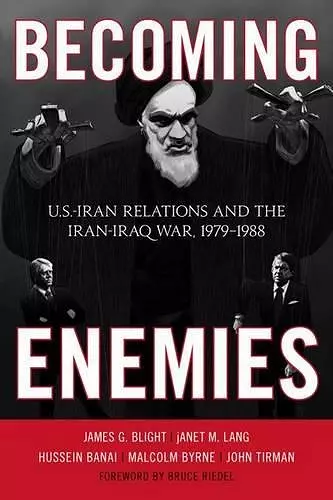Becoming Enemies
U.S.-Iran Relations and the Iran-Iraq War, 1979–1988
John Tirman author James G Blight author janet M Lang author Malcolm Byrne author Hussein Banai author
Format:Paperback
Publisher:Bloomsbury Publishing PLC
Published:25th Feb '14
Currently unavailable, and unfortunately no date known when it will be back

Becoming Enemies brings the unique methods of critical oral history, developed to study flashpoints from the Cold War such as the Cuban Missile Crisis, to understand U.S. and Iranian relations from the fall of the Shah in 1978 through the Iranian hostage crisis and the Iran-Iraq war. Scholars and former officials involved with U.S. and UN policy take a fresh look at U.S and Iranian relations during this time, with special emphasis on the U.S. role in the Iran-Iraq War. With its remarkable declassified documentation and oral testimony that bear directly on questions of U.S. policymaking with regard to the Iran-Iraq War, Becoming Enemies reveals much that was previously unknown about U.S. policy before, during, and after the war. They go beyond mere reportage to offer lessons regarding fundamental foreign policy challenges to the U.S. that transcend time and place.
By applying an innovative methodology ("critical oral history"), by engaging some of the most authoritative voices on the subject matter in a well-informed, candid, and insightful dialogue, and through their own trenchant analyses, the authors of this groundbreaking work provide a fresh perspective on the mindsets, misperceptions, and misguided policies by Iran, Iraq, and the United States, that helped start and prolong what became one of the bloodiest regional wars in the latter half of the twentieth century. For policymakers, scholars, and students pondering the causes of the enduring enmities and mistrust between Iran and the United States today, this book is a must read. -- Ali Banuazizi, Boston College and past president, Middle East Studies Association
An elegantly written treasure trove of fascinating, forgotten, and previously unrevealed history. For those seeking to understand the roots of modern enmity between the U.S. and Iran, Becoming Enemies is a truly unique and wonderful resource. -- Karim Sadjadpour, Carnegie Endowment
A fascinating, eye-opening book about the players and politics of the Iran-Iraq war and the war's domestic and foreign policy repercussions whose effects continue to resonate today. -- Haleh Esfandiari, the Woodrow Wilson International Center for Scholars
Becoming Enemies provides a unique and unrivalled insight into the framing of U.S. policy toward the Iran-Iraq war and the roots of the contemporary American-Iranian antagonism. The innovative approach of critical oral history yields penetrating insights into how policy-makers and officials understood events at the time and in hindsight. This book is essential reading for anyone who wants to understand recent U.S. policy in the Middle East. -- Nigel J. Ashton, London School of Economics and Political Science
[This] book is a very useful source on the Iran–Iraq war, adding a wealth of useful material that was not available before. One of its central themes – that of ‘missed opportunities’ in US–Iranian relations – is also well-taken and critical to an understanding of the topic. * European Political Science *
Too often, Americans seem eager to do things rather than to understand things. For those who wish to understand, this book offers invaluable insights about the world's most dysfunctional relationship. By explaining a key episode in the long conflict between Iran and the United States, it presents invaluable insights. Whether Americans are willing to consider them could make the difference between war and peace. -- Stephen Kinzer, author of Crescent and Star: Turkey Between Two Worlds
The roots of all of America’s current problems with Iraq and Iran lie in our conduct during the Iran-Iraq War. Becoming Enemies provides a profound understanding into that experience. It is a fascinating story, and by presenting it in the words of those who crafted the policy, it gives the reader a rare “fly-on-the-wall” perspective on how American policy gets made, and how the United States got itself into the mess it is in today in the Persian Gulf. -- Kenneth M. Pollack, author of The Persian Puzzle: The Conflict Between Iran and America and Arabs at War: Military Effectiveness, 1948-1991
In this brilliant and disturbing book, America’s foreign policy toward the Islamic Republic of Iran in the 1980s is told, for the first time, from deep inside the U.S. decision making apparatus of the Carter and Reagan administrations. It is a sobering tale of Washington’s misperceptions, ignorance and arrogance drawing on newly declassified documentation and oral testimony from key participants, who struggle to come to grips with how and why the U.S. rallied behind one of the twentieth century’s most brutal despots, Iraq’s Saddam Hussein, in his war with Ayatollah Khomeini’s Iran, thereby sowing the seeds of bitter U.S.-Iranian enmity that exists to this day. -- Patrick Tyler, former Middle East correspondent for The New York Times and The Washington Post
During the calamitous decade following the fall of the Pahlavi regime the Carter and Reagan administrations struggled to reorient the U.S. policy to a Middle East where a central geopolitical pillar had been upended. This was a decade of enormous violence and confusion, and a period when mutual enmity and suspicion were deeply gouged into the collective minds of the Iranian and U.S. political elite. This novel and commendably lucid volume draws on a trove of declassified documents, as well as top scholars and policy experts to offer fresh accounts of defining episodes of the decade. The often enlightening give-and-take of scholars, diplomats and officials, several of whom played leading roles during this fateful period, lends authenticity to the authors' assessments. Given the dangers that continue to haunt U.S.-Iran relations, Becoming Enemies could not be more urgent to read and ponder. -- Augustus Richard Norton, Boston University
A fascinating collection of declassified documents and expert and participant commentary from the time of the Iran-Iraq war. -- Laura Secors, New York Times Book Review
ISBN: 9781442208315
Dimensions: 229mm x 151mm x 29mm
Weight: 612g
408 pages